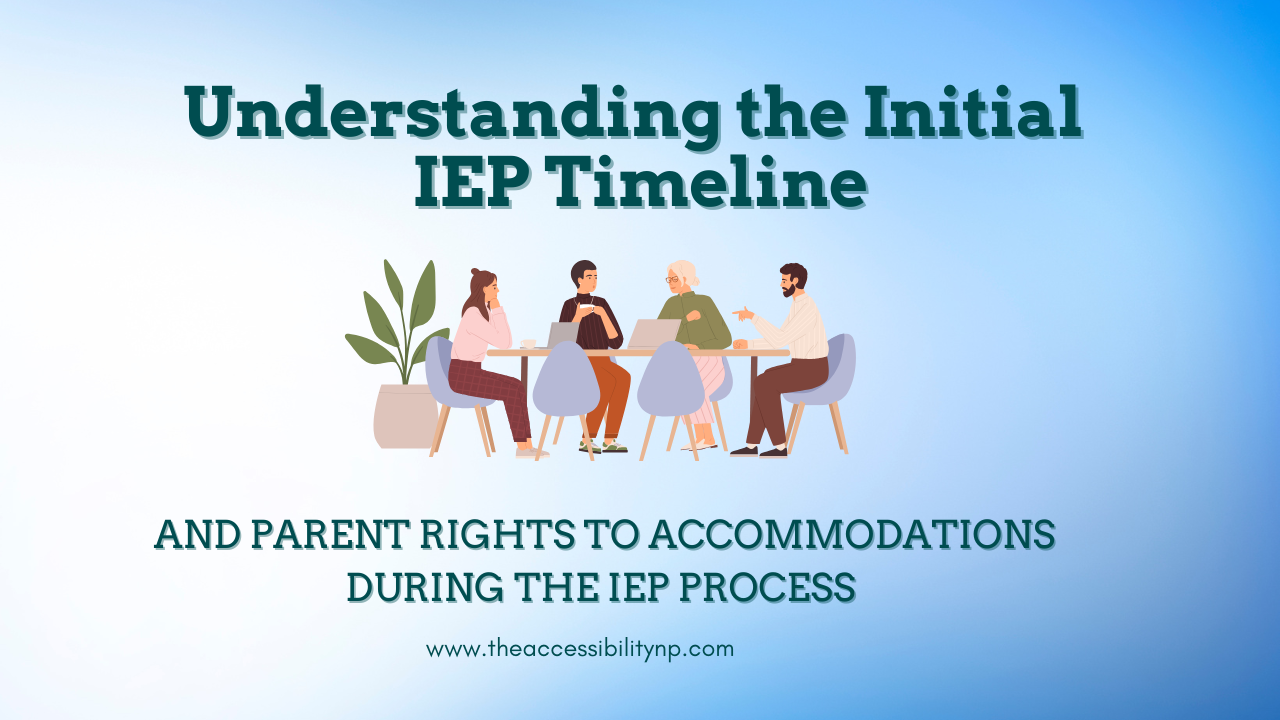When a child is struggling in school, the Individualized Education Program (IEP) process can serve as a critical tool to identify, support, and address their needs. While the IEP process is often child-centered, parents play a vital role as equal partners. It’s important to understand both the IEP timeline and how parents can advocate not only for their child but also for accommodations for themselves during the process.
This post will break down the initial IEP timeline, outline key rights for parents, and emphasize why requesting accommodations in the IEP process is not only valid but essential for equal participation.
What Is an IEP?
An IEP, or Individualized Education Program, is a legal document created for public school students who qualify for special education services under the Individuals with Disabilities Education Act (IDEA). The IEP outlines the student’s unique needs, goals, and the services or accommodations required to support their learning.
The Initial IEP Timeline
Understanding the IEP timeline can help you navigate the process effectively and ensure no steps are missed. The process involves specific deadlines to which schools are legally obligated. While states may have slight variations, IDEA provides clear guidelines for schools to follow.
Step 1: Referral for Evaluation
The IEP process begins with a formal referral for a special education evaluation. Referrals can be initiated by:
- Parents
- Teachers or school staff
- Other professionals involved with the child
If a parent feels their child is struggling academically, socially, or behaviorally, they can make a written request for an evaluation. A written request ensures the timeline begins.
Timeline: Once the written request is submitted, the school must respond promptly—typically within 10-15 days—to determine whether an evaluation is warranted.
Step 2: Consent for Evaluation
If the school agrees to conduct an evaluation, they will request parental consent. This consent is critical because evaluations cannot move forward without it.
Timeline: The school must obtain your written consent before starting the evaluation. Once consent is given, the school has 60 calendar days to complete the evaluation. Some states may have shorter timelines.
Step 3: Comprehensive Evaluation
A comprehensive evaluation assesses your child in all areas of suspected disability. This includes:
- Academic performance
- Speech and language skills
- Social-emotional behavior
- Fine and gross motor skills
- Cognitive ability
The evaluation may involve multiple professionals, including school psychologists, speech therapists, occupational therapists, and special education teachers.
Parent Note: Parents have the right to request an Independent Educational Evaluation (IEE) at the school’s expense if they disagree with the results of the school’s evaluation.
Step 4: Eligibility Meeting
Once the evaluation is complete, the IEP team meets to determine whether the child qualifies for special education services. Eligibility is based on two criteria:
- The child has a qualifying disability under IDEA.
- The disability adversely affects the child’s ability to access and progress in the general education curriculum.
Timeline: The eligibility meeting must occur shortly after the evaluation, and schools typically follow a 30-day window for this.
Step 5: Developing the Initial IEP
If the child is found eligible, the IEP team—comprising parents, teachers, service providers, and school staff—will meet to create the IEP. This plan includes:
- Present levels of academic achievement and functional performance (PLAAFP)
- Measurable annual goals
- Special education services, supports, and accommodations
- Placement in the least restrictive environment (LRE)
Timeline: The IEP must be developed within 30 days of determining eligibility.
Step 6: Implementation of the IEP
Once the IEP is finalized and signed, the school must begin implementing it as soon as possible. Services and supports outlined in the IEP must be provided immediately or within a reasonable timeframe.
Timeline: There is no grace period for implementation once the IEP is in effect.
Parental Rights in the IEP Process
Parents are central to the IEP process and are protected under IDEA as equal partners in decision-making. Understanding these rights can empower parents to advocate for both their child and themselves during IEP meetings and evaluations.
Right to Participate
Parents have the right to fully participate in all aspects of the IEP process. Schools are legally required to involve parents in:
- Evaluation decisions
- Eligibility determinations
- IEP development
- Placement discussions
If parents cannot attend a meeting at the scheduled time, the school must reschedule to accommodate them or provide alternative methods, such as virtual meetings.
Right to Understand the Process
The IEP process can be filled with complex terms, acronyms, and procedures. Parents have the right to fully understand the process, including:
- Receiving clear explanations of evaluations and documents
- Having interpreters available if English is not their primary language
- Asking questions and requesting clarifications throughout the process
Tip: Don’t hesitate to ask for simplified explanations or additional documentation to help you understand evaluation results or IEP components.
Right to Request Accommodations for Themselves
While the focus of the IEP process is the student, IDEA also protects parents’ ability to meaningfully participate in the process. If parents are disabled or face barriers to participation, they have the right to request accommodations for themselves. This is particularly important for parents who:
- Are disabled (e.g., deaf, blind, or neurodivergent)
- Have limited English proficiency
- Have processing, comprehension, or organizational challenges
Examples of Parent Accommodations
1. Language and Communication Supports
- Interpreters: Schools must provide qualified interpreters for parents who use sign language or have limited English proficiency.
- Written Materials in Accessible Formats: If a parent is blind or visually impaired, IEP documents should be provided in Braille or large print.
Example: A parent who is hard of hearing can request captioning or sign language interpreters for all IEP meetings and communications.
2. Processing and Comprehension Supports
- Extra Time: Parents can request additional time to review documents and prepare for meetings.
- Breaking Down Information: Meetings can be paced to ensure parents understand each section before moving on.
Example: A neurodivergent parent who struggles with information overload can ask for shorter, multiple sessions rather than one long IEP meeting.
3. Physical and Sensory Accommodations
- Accessible Meeting Locations: Meetings should be held in physically accessible rooms for parents using wheelchairs or mobility aids.
- Sensory-Friendly Settings: Parents sensitive to lights, sounds, or sensory stimuli can request accommodations like dimmed lights or quieter spaces.
Example: A parent with sensory processing challenges might ask for the meeting room to be free of distractions, noise, or fluorescent lighting.
4. Support for Executive Function Challenges
- Meeting Notes and Summaries: Parents can request written summaries of discussions and decisions made during the meeting.
- Agenda in Advance: Schools can provide a meeting agenda and key documents in advance to help parents prepare.
Example: A parent with ADHD can request a written agenda beforehand and clear next steps following the meeting to stay organized.
How to Request Parent Accommodations
If you need accommodations to participate in the IEP process, follow these steps:
- Put It in Writing: Submit a formal, written request to the school outlining the accommodations you need and why.
- Be Specific: Clearly describe the type of support or accommodation required (e.g., “I need a sign language interpreter for the IEP meeting on March 10”).
- Follow Up: Ensure the school acknowledges and responds to your request promptly.
Sample Request:
“Dear [School Staff/IEP Coordinator],
I am requesting an accommodation for the upcoming IEP meeting for my child. As I am hard of hearing, I will require a qualified sign language interpreter to fully participate in the discussion. I appreciate your support in arranging this accommodation.”
Schools are legally obligated to address parent accommodation requests under IDEA and Section 504 of the Rehabilitation Act, which prohibits discrimination against individuals with disabilities.
Why Parent Accommodations Matter
The IEP process can be overwhelming, but every parent deserves a seat at the table where decisions about their child’s education are made. By requesting accommodations, parents can:
- Fully understand and participate in IEP meetings
- Effectively advocate for their child’s needs
- Collaborate with the school team to ensure the best outcomes for their child
Equal access to the IEP process is not a privilege—it’s a right protected under federal law.
Final Thoughts
The initial IEP process involves clear timelines, structured evaluations, and collaborative meetings to identify and address a child’s educational needs. Equally important is recognizing the role of parents as partners in the process.
Parents not only have rights to advocate for their child but also for themselves to ensure they can meaningfully participate in the process. Accommodations for parents are a legal right and a necessary step toward creating a truly inclusive and accessible IEP process for families.
Navigating this process can feel complex, but remember that you are not alone. By understanding the IEP timeline and advocating for your own needs, you can ensure that your child’s IEP reflects their strengths, challenges, and the supports they deserve.
See you next Monday. Stay inspired and keep pushing for accessibility!

